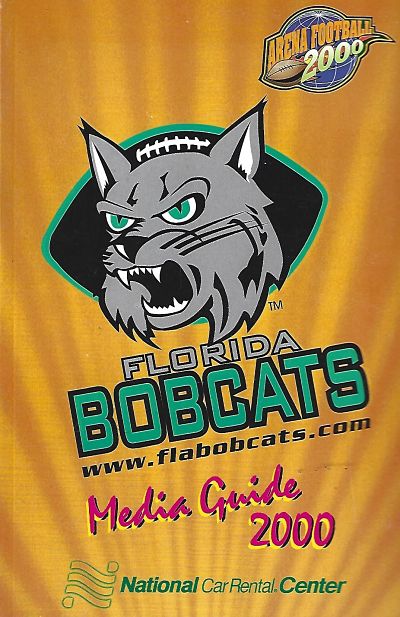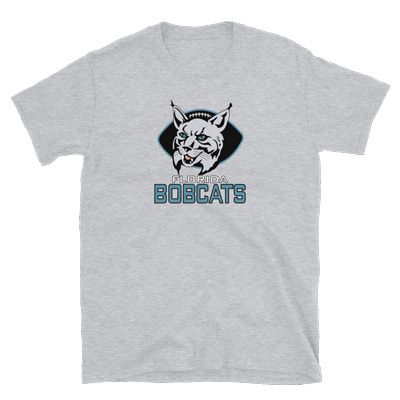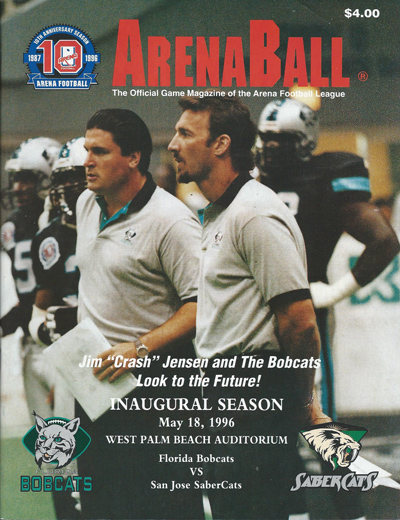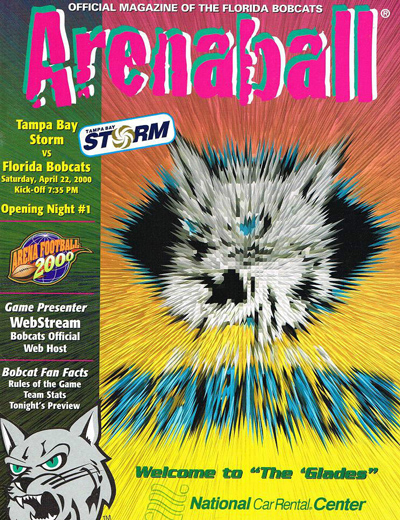Arena Football League (1996-2001)
Florida Bobcats
Tombstone
Born: December 1995 – The Miami Hooters relocate to West Palm Beach, FL
Folded: 2001
First Game: April 26, 1996 (W 55-27 vs. Connecticut Coyotes)
Last Game: July 21, 2001 (L 73-56 vs. New York Dragons)
Arena Bowl Championships: None
Arenas
1996-1998: West Palm Beach Auditorium (4,700)
1999-2001: National Car Rental Center (17,900)11999 Arena Football League Official Record & Fact Book
Marketing
Team Colors: Teal, Black & Silver21999 Arena Football League Official Record & Fact Book
Owners
Owners:
- 1996: Bruce Frey & Lowell Paxson
- 1997-2000: Bruce Frey et al.
- 2000-2001: Dr. Michael Gelfand
Best Seller
We earn commissions from purchases made through links in this post
Florida Bobcats Logo T-Shirt
Now Available from Royal Retros
Background
The Florida Bobcats were a sad sack Arena Football League outfit that wandered in the wilderness for a decade in the notorious pro sports graveyard of Southern Florida. Ownership squabbles and building problems plagued the franchise throughout its existence. The team was also reliably terrible in competition, posting ten straight losing seasons.
The Bobcats’ origin dates back to March 1992 and a proposed expansion club called the Los Angeles Wings. The franchise never played a down in Los Angeles, drifted through Northern California for a single season (1992) as the Sacramento Attack, and later turned up in Miami, named for the Hooters restaurant chain. Depending on your worldview, the Miami Hooters (1993-1995) were either the world’s first men’s professional team named after large breasts, or the second one named after owls.*
Into the Leaky Teepee
West Palm Beach real estate investor Bruce J. Frey bought the club from Hooters exec Dave Lageschulte in September 1995 and re-branded as the Florida Bobcats. Frey’s original investment partner in the Bobcats was Lowell “Bud” Paxson, co-founder of the Home Shopping Network. Frey and Paxson hoped to put together a South Florida sports empire consisting of the Bobcats, a minor league hockey team and the planned Miami expansion franchise for Major League Soccer. But the MLS franchise went to a rival bidder, the hockey effort stalled and Frey and Paxson soon had a falling out.
For their first three seasons, the Bobcats played in the tiny 5,000 West Palm Beach Auditorium, AKA the Leaky Teepee. The building was by far the smallest in the AFL. It was viewed as a temporary venue until Frey and the AFL could help persuade the West Palm Beach city elders to build a 12,000 – 15,000-seat arena. In 1997, the league scheduled a number of the Bobcats “home” games in neutral sites around the country, rather than play in West Palm Beach. In 1998, the Bobcats were booted out of the Auditorium midway through the season after the city sold the building to the Jehovah’s Witnesses.
Sunset in Sunrise
The Bobcats finally moved into the brand new 18,000-seat National Car Rental Center in Sunrise for the 1999 season. The huge building only highlighted the community’s disinterest in the Bobcats. On May 3, 2011, the Bobcats announced the smallest crowd in the 22-year history of the original Arena Football League when 1,154 fans showed up for a game against the Los Angeles Avengers. In classic Bobcats fashion, the team chose this night to pull out one of their rare victories. Their overall record during the Florida years was 25-59.
From a football perspective, the most noteworthy Bobcat was probably quarterback Fred McNair, older brother of NFL All-Pro Steve McNair of the Tennessee Titans. McNair took most of the snaps for Florida over four seasons from 1996 to 2000.
Hard Cases
Dating back to the Hooters days, the franchise also had a knack for attracting high-profile troubled players. In 1994, the Hooters signed former Miami Dolphins All-Pro receiver Mark Duper, whose late career was dogged by drug suspensions and criminal indictments. The Hooters also featured lineman John Corker, a prodigiously talented defensive lineman whose NFL career was derailed by a voracious cocaine habit. Corker’s career ended in 1995 and he spent parts of the next decade homeless, before seeming to turn his life around, as described in this 2012 New York Times profile.
In 2001, the Bobcats signed toxic draft bust running back Lawrence Phillips, who bounced out of the NFL two years earlier, but was still only 25 years old. Phillips’ signing made headlines, but he vanished from Bobcats training camp less than a week later. He never played a down in Arena Football. Phillips is currently serving a 25-year sentence in California state prison.
The Bobcats finally folded after the 2001 season.
*The Chicago Owls (1968-1969) of the Continental Football League were the other, if you’re keeping score at home.
Florida Bobcats Shop
[auction-nudge tool=”listings”]
Downloads
6-19-1998 Bobcats & New Jersey Red Dogs Roster
6-19-1998 Florida Bobcats @ New Jersey Red Dogs Roster
Links
###





One Response
i remember the bobcat the okc wrangler was mention of contraction back in 2001 and their home venue is west palm beach arena